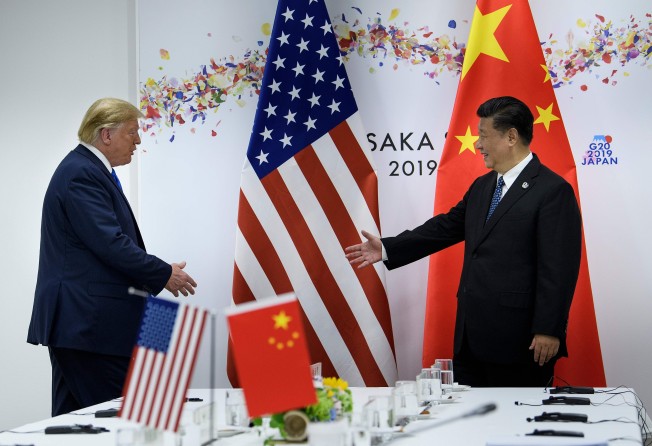Trade war: China and US to hold phone talks on Friday after Apec setback
- Chile pulls out of hosting Apec summit, at which Presidents Xi Jinping and Donald Trump planned to meet
- Cancellation could allow more time to strike better trade deal, which need not require a presidential summit, observers say

Top trade negotiators from China and the United States will hold a phone conversation on Friday, the Chinese commerce ministry has announced, as the countries’ talks remained on track despite plans for their respective presidents to meet in Chile being disrupted.
A spokesman for the ministry said the two countries had maintained close communication and negotiations were going well.
The announcement came hours after next month’s Asia-Pacific Economic Cooperation (Apec) summit was cancelled by its host nation Chile, catching Chinese officials off guard.
Chinese President Xi Jinping and his US counterpart Donald Trump had been expected to meet on the sidelines of the Apec leaders’ meeting in Santiago, scheduled on November 16 and 17, and sign an interim trade agreement.
The Xi-Trump meeting was plunged into uncertainty when Chile’s President Sebastian Pinera cancelled the Apec meeting because of the country’s anti-government protests. But Chinese diplomatic observers and government advisers said the Apec cancellation had eased the pressure on negotiators from China and the US to rush to strike a partial trade deal.
The proposed interim agreement was based on talks completed on October 11 between Chinese Vice-Premier Liu He and the US’ Trade Representative Robert Lighthizer and Treasury Secretary Steven Mnuchin. Trump said the two sides had reached a “substantial phase-one deal” that may be ratified by himself and Xi at the Apec meeting.
Shi Yinhong, a Chinese state councillor and international relations professor at Renmin University, said the Apec cancellation may give Chinese and US negotiators more time to work out a better deal, adding that the schedule had been tight to wrap up a written agreement, even a partial one.
“The cancellation of Apec is not necessarily a bad thing,” Shi said. “It could be worse if they rushed a premature deal and later fell out again. Even if a partial deal was signed during Apec, there was still a chance that things would deteriorate if the deal was not good enough.”
After the October talks, the United States postponed its plan to increase tariffs on US$250 billion worth of Chinese goods by 5 percentage points to 30 per cent, but did not say whether a new 10 per cent tariff on US$156 billion worth of Chinese products would be introduced as planned on December 15.
The White House said after Chile announced the Apec cancellation that it still expected to sign an initial trade agreement with China next month, but that no alternate location had yet been set for Xi and Trump to meet. Mnuchin said discussions with China had been productive.
Reuters, citing sources familiar with the issue, said the US intended to host Trump-Xi meetings in Alaska and Hawaii, while China has suggested Macau as a possible venue.
A commentary by Taoran Notes, a social media account affiliated with state-run Economic Daily, said that the phone call on Friday meant the negotiations were not affected by “external factors”, and that the suggestion a deal could be signed in Macau was “groundless speculation”.
Pang Zhongying, an international relations professor at the Ocean University of China, said it was unlikely Trump would meet in a Chinese location given ongoing China-US tensions, but that Brazil could be a feasible location if the presidents were eager to meet. Xi is due to visit Brazil next month.
“It would be difficult for Trump to go to China because the current relations between the two nations are tense,” he said. “I don’t think the US is willing to accept that.”
But Liu Weidong, a China-US affairs expert from the Chinese Academy of Social Sciences, said it was unlikely China would be in a hurry to arrange a bilateral summit.
“China believes that the matter has not reached an urgency that they have to immediately organise a bilateral summit,” he said. “But both sides want to sign a phase-one deal, and China may consider alternatives, such as having Liu He and US representatives sign it first.”